Stories of Resilience 2021
We are proud to feature in Stories of Resilience 2021, celebrating the collaboration of organisations supporting people in the UK’s immigration system during the pandemic.

We are proud to feature in Stories of Resilience 2021, celebrating the collaboration of organisations supporting people in the UK’s immigration system during the pandemic.

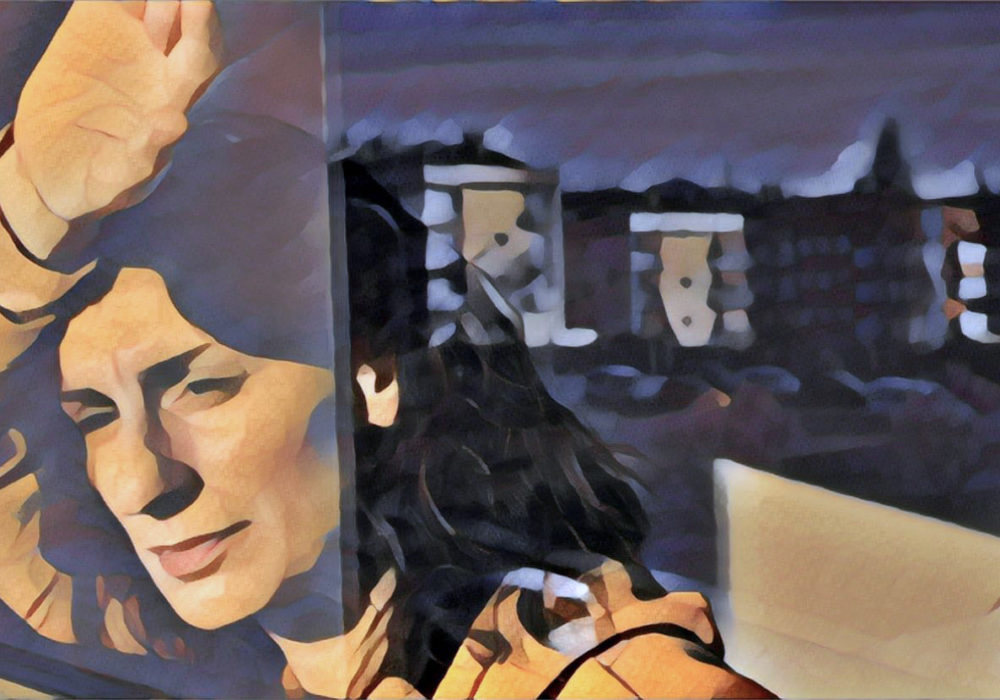
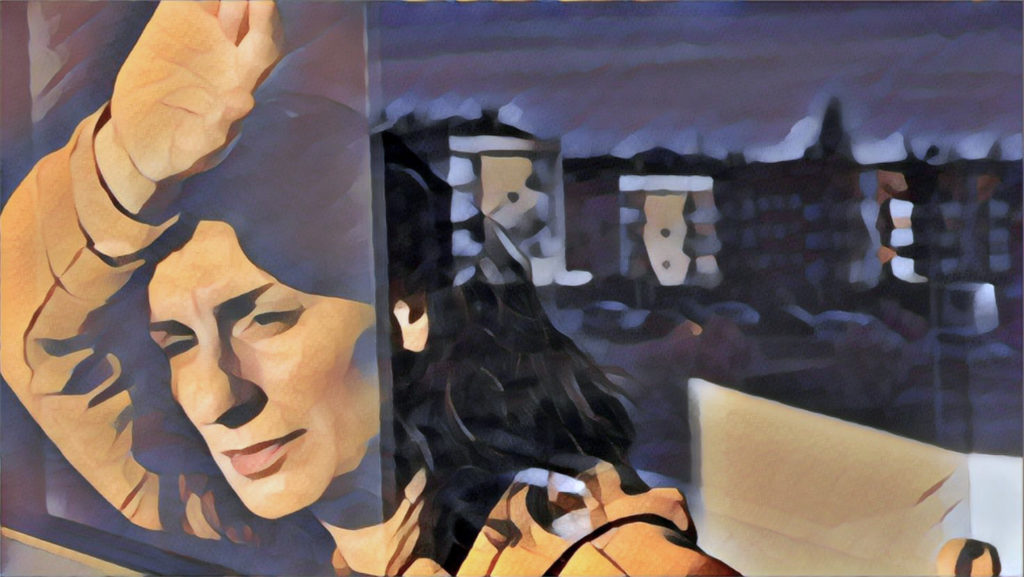
Each room is clean, with wifi and a TV. Each room holds a person or a family trapped in a small space with no control over their life, few ways to keep occupied or feel productive and no knowledge of how long they will stay there or what the future holds. No one expected to end up living long term in a hotel. But because of Covid, approximately 20,000 people from all over the world, exist in this strange in-between world of government appointed hotel living.
When people seeking asylum first checked in, they received zero financial assistance beyond room and board. If they arrived without sufficiently warm clothes (which many did), needed lotion for dry skin or toys for their children, most were unable to purchase it. If they needed assistance of any kind, they were told to consult informational brochures (mostly in English) or to call Migrant Advice, a government hotline, where after a long wait time, all issues are logged and reported, but rarely resolved.
Eventually, under pressure, the government began to give people seeking asylum £8 a week, and in Bristol at least, to allow charities into the hotel to assist people. Bristol Refugee Rights (BRR) and The Haven (a medical practice dedicated to refugees and people seeking asylum) went to work.
Every week Alice and Andrew from BRR go into the hotel. They set up a desk in the hall and try to untangle the complex jumble of problems most residents face. Many of the issues people want solved; they can’t actually help with. People say: I just want my case resolved. I need more money. I want to bring my children. I want to bring my wife. And Andrew, the drop in manager, has to be the person who says there’s nothing BRR can do about that. Some people come every day, worried about family members in a refugee camp back home where there is a war, who they can’t get a hold of. Sometimes people just want someone to talk to, to hear their story. One man from Syria expected his asylum application to move quickly, but a year on and he hasn’t even received a date for his initial interview, (the first step in the application process). Back in Turkey where his family waits, they’ve run out of money and the landlord is asking his wife for ‘favours’ in order to pay the rent.
Another man in his late 30’s from Eritrea was very distressed because his wife and children called from a refugee camp in Tigray to tell him they were moving somewhere else, but he missed the call and had no credit on his phone to call them back. Thankfully, this was something BRR could help with. They got him phone credit so he could call his family and then referred him to the Red Cross for family tracing.
The staff from Bristol Refugee Rights help people to get signed up for health and dental services, to get phone credits, and phones that can access the internet so they can attend English, Well-Being and fitness classes. They work to get the phones confiscated from people seeking asylum on arrival by the government, returned. They link people to solicitors, help register children for school, and tell residents about any local services that could be helpful. Over time this kind of assistance has helped to build trust among the residents, many of whom were too terrified to speak to anyone in the beginning or to accept help.
Although most residents are grateful for any assistance and very aware how much better their situation is compared to their families in refugee camps, or those in the UK, who are placed in detention camps, it’s still very difficult. Many find the lack of control, especially around food disheartening. One Middle Eastern woman called Safiye often talked about how much she missed cooking. It was the activity that used to provide structure to her day. The scent and taste of the bread she would bake each morning gave her the feeling of home and safety. English bread doesn’t taste the same, she tells Alice, on her way to pick up her lunch meal, which will be one of the three very basic dishes the hotel continually rotates through.
There is no common area or group activities and people must eat meals in their own room, where visits from other residents are not allowed. This results in a close proximity with a large number of strangers from other countries, languages and cultures, while not allowing space or opportunity for any social interactions or connection.
Some families are finally starting to check out from the hotel. Safiye and her family, who fled political persecution, arrived after a two-year journey across dangerous borders and through squalid refugee camps. They spent one year living in the hotel, which their six-year-old son Ismail found particularly difficult. He was very lonely, and had nowhere to play. When he was finally enrolled in school, they didn’t have money for the uniform and Ismail spoke little English so he felt like a complete outsider. BRR helped his family to get him the correct uniform, gave the family two phones so that both mother and son could work on their English and bought Ismail a scooter so he could get to school easier. It took time, but eventually Ismail started to feel more comfortable. Now the family has been assigned a place in shared housing, which means Safiye gets to cook her own food again. And she gets to make bread. It will be the first step towards building a settled life, towards feeling at home.
By Tannith Perry
Become our regular donor so we can continue to support people seeking asylum.
More blog pieces:
Read ‘Keep Body and Soul Together: Surviving The Asylum System’
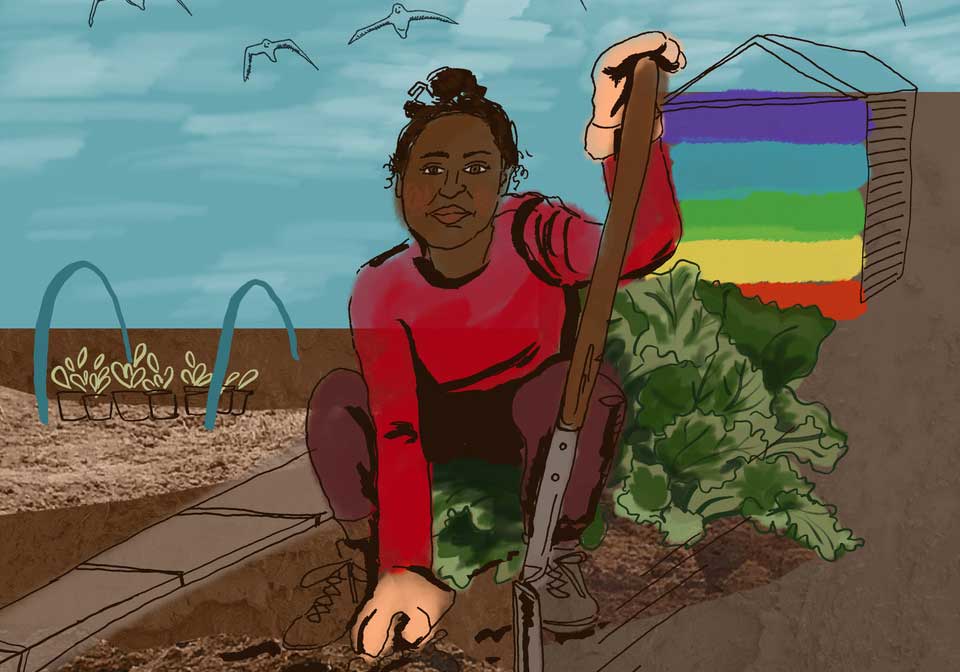

All illustrations by Laurel Molly. Find her on Instagram @laurel_molly.
“When I first arrived at Bristol Refugee Rights welcome centre, I realised that the name is perfect for this place. The staff really mean what they do. I felt so welcomed and looked after. The team did the best in every way and they saved me.”
Gayesha is from Sri-Lanka seeking sanctuary in the U.K. She came to our Welcome Centre in autumn 2019. She was destitute and reliant on support from friends. We provided her food packages and hardship payments. She started volunteering for us every week and joined our Pride Without Borders project to feel safe in a LGBTQ+ support group. Her situation was complicated and she had been in an exploitative situation. We referred her to The Haven. This way she had access to therapy sessions and a GP. She had not yet claimed asylum, so we explained her options to her and increased her knowledge on the asylum system. For medium term solutions, we applied to the Home Office to find her housing and an allowance for her sustenance. This was granted but outside of Bristol. We then documented how critical it is for her to stay in Bristol to access appropriate services and eventually she was given housing in Bristol city.
Since the first lock-down, Gayesha is receiving ongoing support including weekly calls and gardening supplies to grow vegetables in her back garden. We have provided her phone credit so she can stay in touch and food bank referrals so she has enough food. She said “When I first came, I was mentally down, suffering from very low mood. BRR team really encouraged me a lot with their kind words, they helped me become a volunteer. I did this once a week and it felt so good to help other people. When lockdown began I became very down again, feeling stressed stuck in the house all the time. But BRR gave me seeds and tools to garden. I grew chillies, cabbage, tomatoes, potatoes etc. Each time I went to the garden, seeing the plants grow made me feel very happy. I join online yoga sessions and exercise classes. People from BRR still call me regularly, provide food packages and vegetables. I am so grateful for all their help.”
By Maite Ibanez Bollerhoff
To become our regular donor so we can continue this important work, click here.
Read “Keep Body and Soul Together: Surviving the Asylum System”.
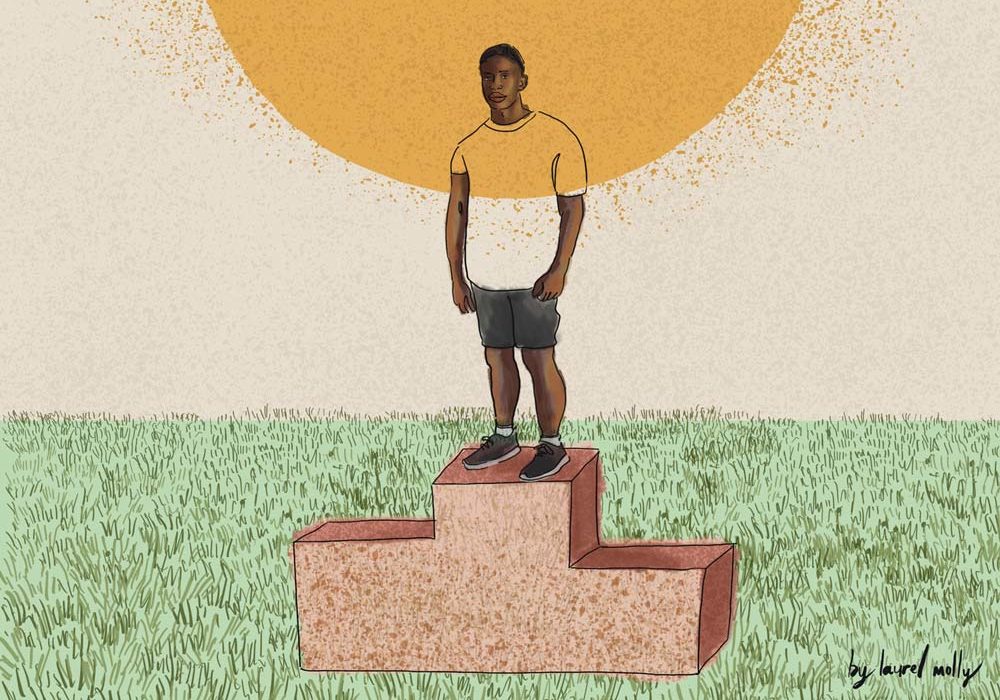
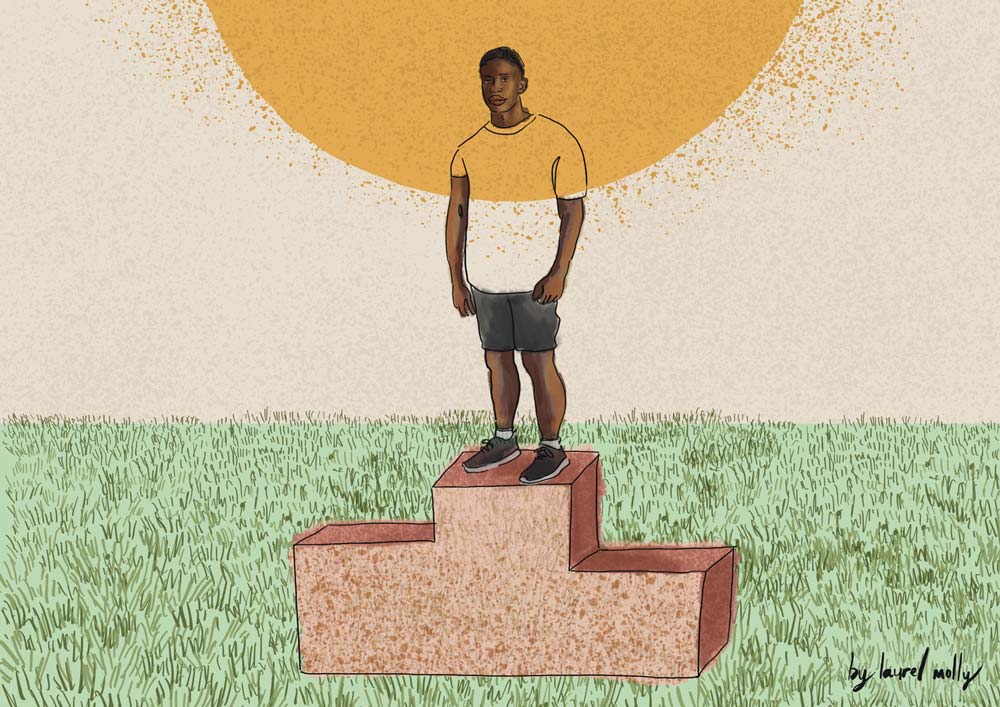
All illustrations by Laurel Molly. Find her on Instagram @laurel_molly.
“I am sad to inform you that your application has been denied” – Home Office.
Growing up, I did not get to experience typical childhood, teenage fears, and anxieties. Instead, I had thoughts such as “Do I have enough money to afford a 99p loaf of bread at Lidl?”, “Once I am 18, will I have to go to the police station every Wednesday to sign? What if I get detained? “Do I have the option to go to university after college and, if not, can I at least go travelling or even get a job?”
The constant thoughts that bugged me over year after gruelling year of going through the immigration process have been “What on earth am I going to do?”, “My sister is thirteen and it breaks my heart to think that she might become homeless”, “My brother has been detained for the third time, I am scared for his life, but I do hope he is well!”
Some of my most vivid memories of this time were not being able to afford broadband during my last year of GCSEs. I would go to the library after school and after closing hours, sit outside in the dark for hours with my laptop in the middle of the winter, so that I could revise, complete assignments, and maybe watch an episode or two of Friends. Another was moving into a shared 3 bedroomed house with my parents, younger sister and two complete strangers. Not only was it awkward to live and act freely, I had to explain our living situation to a friend who once stopped by and met an unrelated person in the front room. Sometimes the heaters would stop working, so we would stay in the kitchen and keep the oven door open to keep warm in the colder months.
All these are thankfully distant memories that I now reminisce and joke about. But not everyone comes out of the other side with settled status. Those of us who do often have to deal with the aftermath and the toll immigration process has taken on our mental health.
I think most people eventually learn to deal with the stress of the uncertainty of the asylum process. It is the often overwhelming, though subconscious, baggage that comes with that stress that persists – the little irrational thoughts and fears, the lack of trust that builds, the lack of self-confidence, the distorted self-image, broken relationships and families. Although, I have been lucky enough to come out of this process sane, most people are met with quite a different fate.
It’s not all sad stories though. I have met some of the most incredibly generous and kind people along the way – close friends that have been there for me and charities that have supported me and my family throughout. Now I work with Bristol Refugee Rights providing exercise classes for people seeking asylum and new refugees. Exercise, especially strength training, has been very helpful and therapeutic for me throughout the asylum hardship and it continues to be that way now.
I started exercising originally to get away from the stress, to change the way I looked and the way other people saw me. However, I ended up staying for the unexpected and invaluable lessons that l learned along the way.
I found that exercising – mainly strength training – was the only thing in my life that I had full control over. My progress was purely based on how much effort I had put in and I could decide to get stronger at my own pace. In a world where everything seemed uncertain, having this sense of certainty meant a lot to me. Now, I am a Strength Coach and alongside my work, I coordinate exercise classes for Bristol Refugee Rights, with the hope of sharing my love for strength training. This is so that members of BRR and my clients alike can develop their own interest, take control of and connect with their bodies.
I can also now afford that bread from Lidl.
Having been through the asylum system myself, I have great respect for anyone who comes here for a better life or is running away from persecution – as my family did.
I share my story with the hopes that anyone who reads this will look at refugees, asylum seekers and immigrants at large a little kinder, a little less judgemental, a little more patient and be a little more considerate.
By Tim.
Donate to our important work to empower people seeking asylum.
Read about Sireen’s experience coming to U.K. for the first time.
Read our member Mosi’s experience in the Penally Camp Army Barracks.
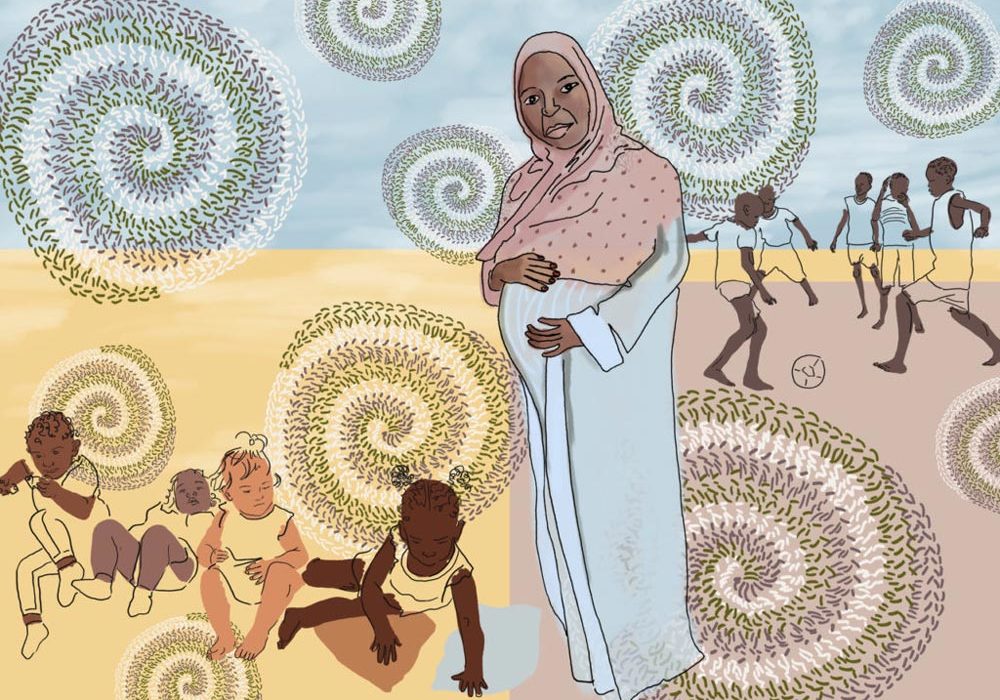
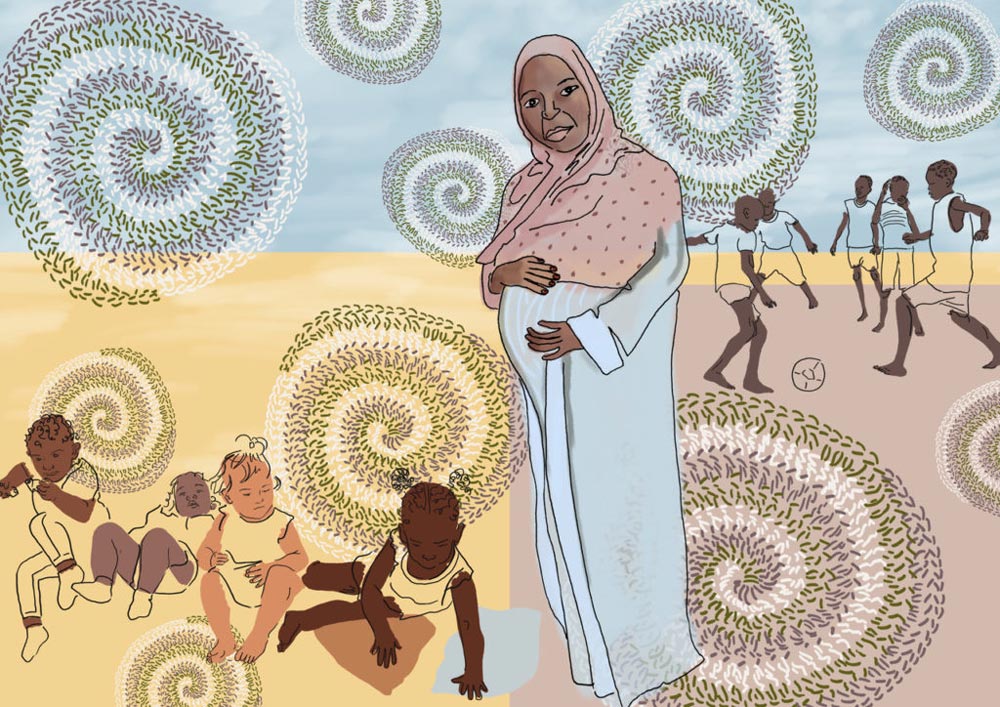
All illustrations by Laurel Molly. Find her on Instagram @laurel_molly.
When Sireen came to join her husband in the UK under the refugee family reunion scheme, she found life in the UK incredibly difficult. Everything was stunningly different; from the weather, to the culture to how to open doors. She didn’t speak any English. Her husband was working and studying long hours and she spent the days mostly by herself. Back home in Sudan she was used to the friendly noises of children playing in the street and neighbours chatting. Here in the UK she found the quiet flat and empty neighbourhood streets ominous and strange.
But it was also terrifying to venture out of the flat. When people spoke to her in the street she had no idea what they wanted and so she was frightened. She felt totally dislocated and miserable. She cried every day and thought often about returning home. When she told her husband she wanted to go back, he realised something had to change. He took her to Bristol Refugee Rights (BRR), which had helped him in the past when he’d arrived.
That visit to Bristol Refugee Right’s Welcome Centre would change everything for Sireen. On her first day she found people who spoke Arabic, people who were like her, forced to leave their homes and start from scratch in a new country. For the first time since arriving, she felt safe.
After that she kept going back. She made friends with Arabic speakers including one woman who turned out to live near her house. She enrolled in BRR’s English classes, learned how to crochet in the arts and crafts group and encountered for the first time the idea of creating a schedule for her day. All of which cheered her up, made her feel productive and boosted her confidence.
But just when Sireen felt like she was starting to get her feet, life intervened again. Due to a Home Office error, her refugee visa and the rights it bestowed, were revoked. And around the same time, Sireen miscarried her first pregnancy. With her husband in pharmacy school and her family far away, she struggled to cope with grief over the loss of her pregnancy and the stress over her visa. She kept going to the Welcome Centre and the staff would spend hours talking to her, showering her with care and concern. They also helped to distract her. She joined the Wednesday group outings to surrounding villages, the beach and the city centre. It kept her busy and surrounded by people who cared about her. Without this assistance she doesn’t know how she would have survived that time.
“The staff act like cheerleaders,” Sireen said. In every new challenge she faced, from dealing with the Home Office to learning to drive, they remembered what was happening in her life, asked about it, and cheered her on. “Having that encouragement made all the difference. You can do it, they would say. This was really helpful.”
When Sireen got pregnant again, BRR also helped her learn how to engage with the health services, prepare for childbirth, and care for an infant. When Sireen and her husband went to the hospital for her to give birth, he was amazed at how prepared and informed she was about how to navigate the system.
Once her child was born, she soon returned to the Welcome Centre. She was now volunteering for the charity— working a variety of roles from kitchen help to interpreter. The creche allowed her to continue to be involved with her child nearby. It was in the creche, during her second pregnancy that she first encountered the idea of running her own business. She wanted to work with children but now that she was pregnant again she thought she’d have to postpone her dream. They gave her the idea of working from home. But instead of just throwing out a suggestion, in true BRR fashion, they supported her in actually achieving her goal. They researched the necessary courses she needed to take, introduced her to the people on the city council who ran the induction for licensed child-minders, linked her to organisations related to the field and helped her to write her admission and safe guarding policies. They also provided the references needed in order to be licensed. She now runs a successful childcare business from her own home.
Although Sireen loves her new job taking care of children and is happy to stay in the UK, she misses just sitting and being with family. “That’s why I like BRR,” she says, “because you can sit and be with the people who care about you. You can feel the feeling of home when you just sit and talk. If I am upset, if I am happy, I go there. It isn’t one person, it’s the whole staff, it’s the whole group of people. In Sudan if you need something, you go to your grandmother, but here in the UK, Bristol Refugee Rights is my grandmother—I go to them.”
By Tannith Perry and Sireen Abdeen Hassan
Read our member Mosi’s experience in the Penally Camp Army Barracks.
Read ‘All Alone, Far Away From Home’ about a young person stuck in the asylum system.